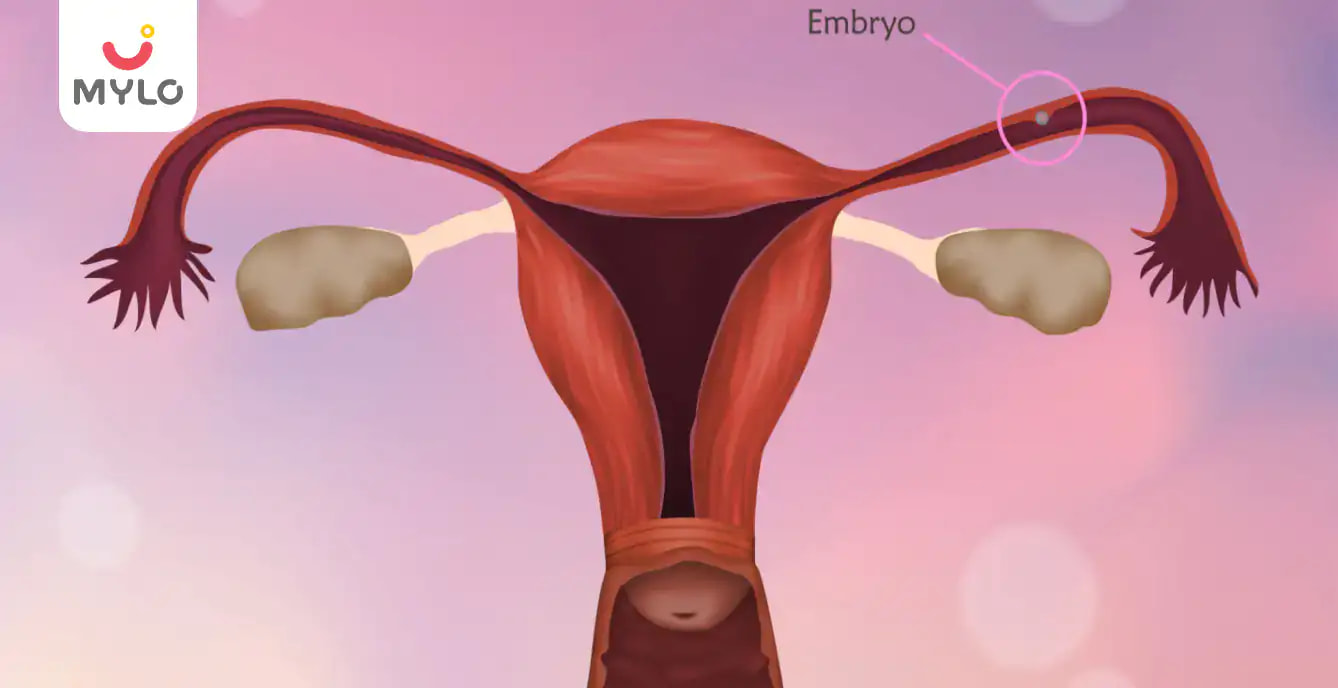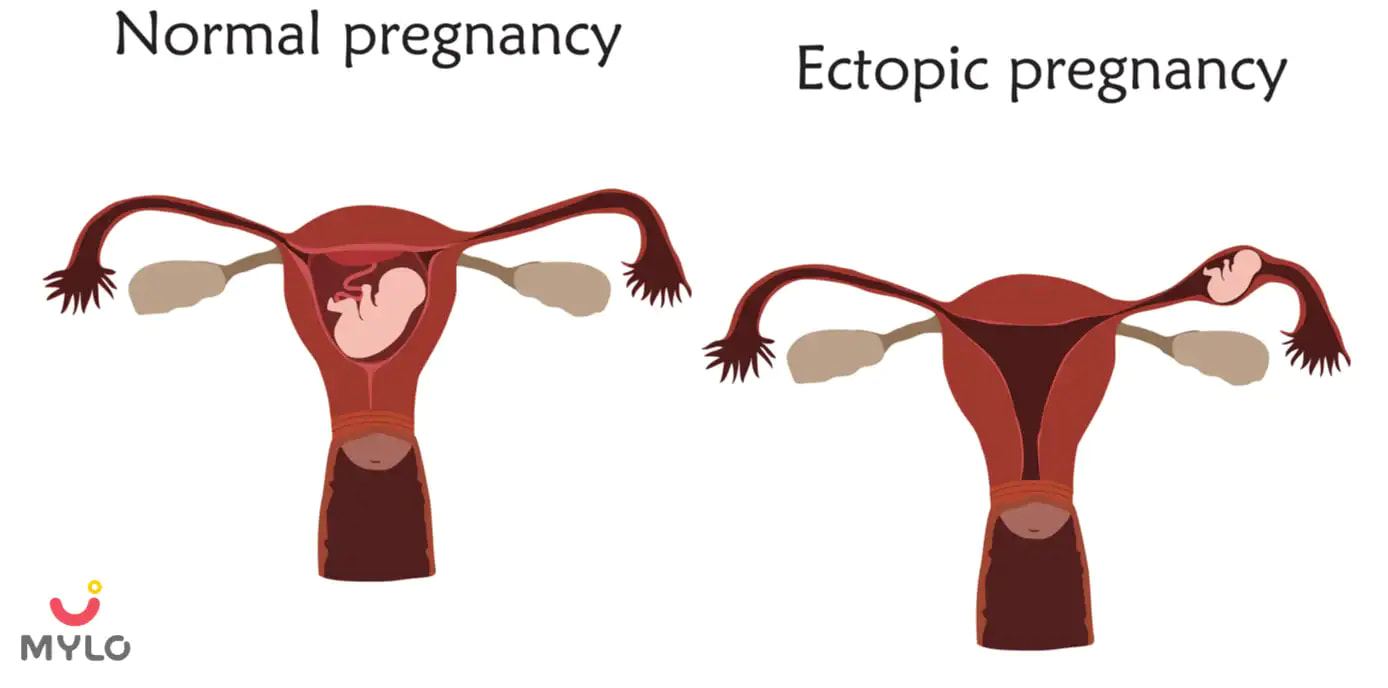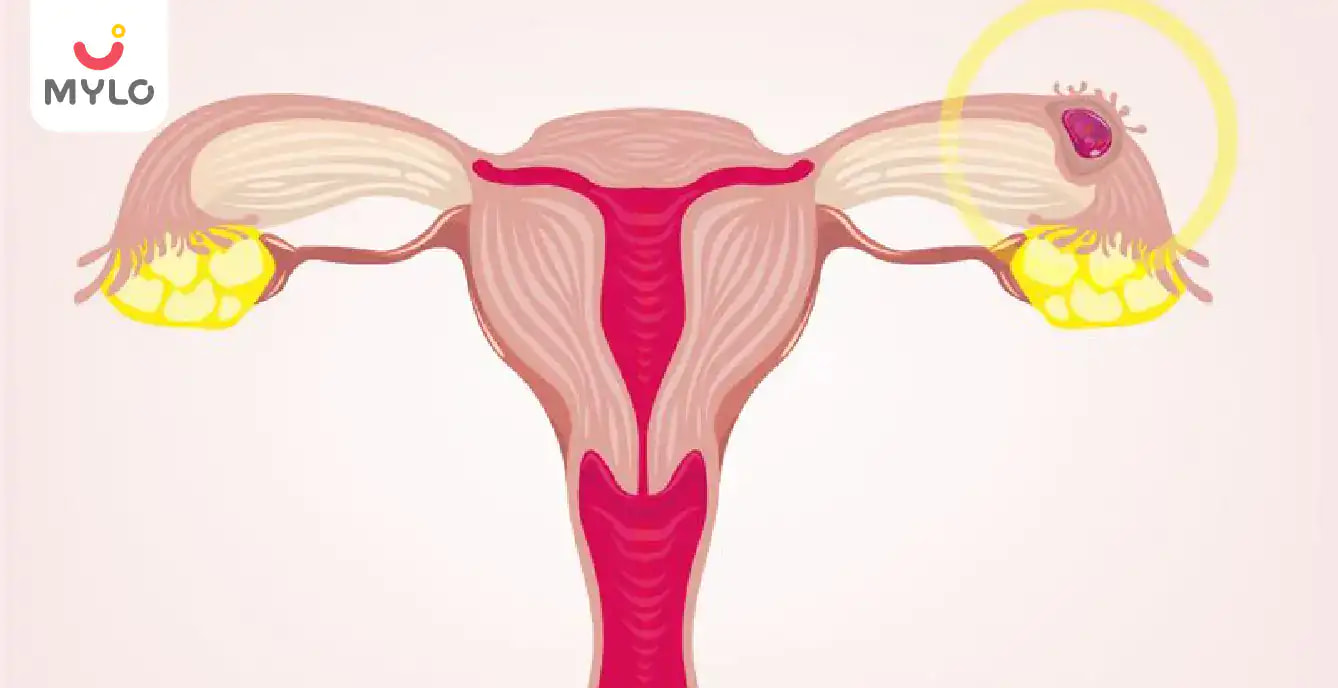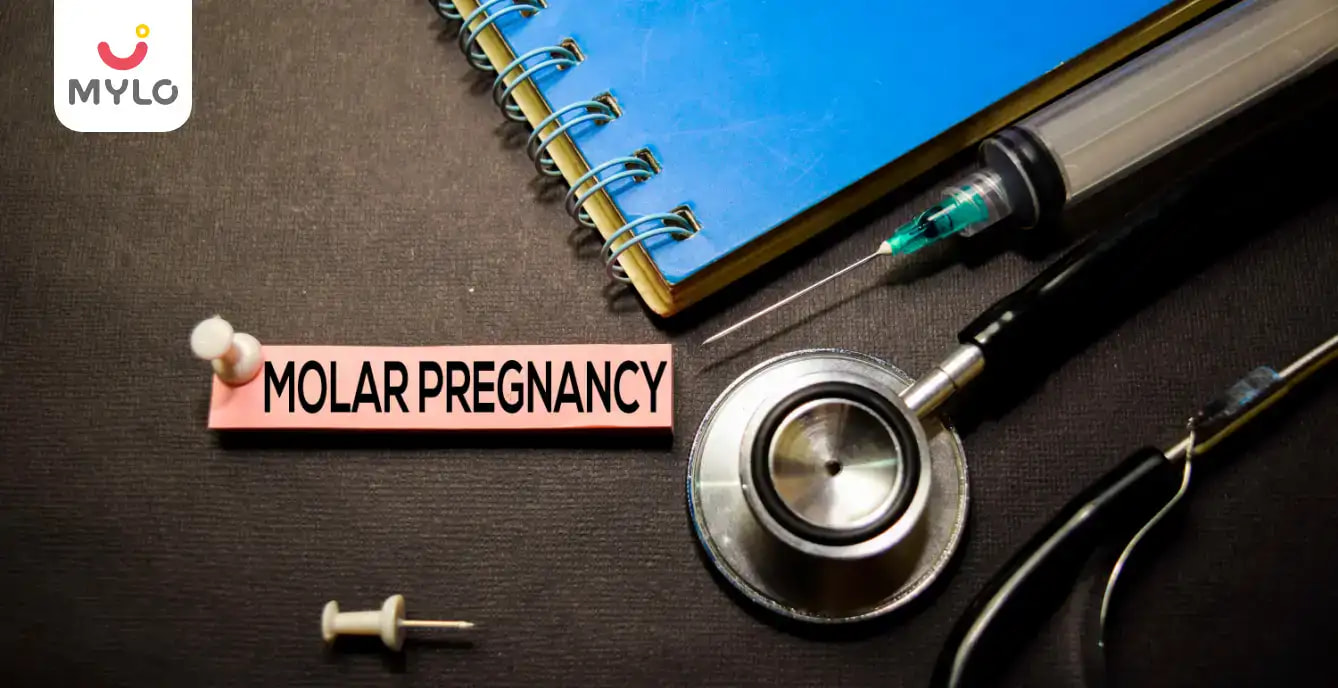Home

When Do Ectopic Pregnancy Symptoms Start?
In this Article

When Do Ectopic Pregnancy Symptoms Start?
Updated on 3 November 2023
Pregnancy is a roller coaster ride and not completely free of complications. Ectopic pregnancy is a serious condition that occurs when the fertilized egg implants itself outside of the uterus, usually in one of the fallopian tubes. It can be life-threatening if not diagnosed and treated promptly. One of the key factors in diagnosing ectopic pregnancy is recognizing its symptoms. But when do they typically start?
In this article, we'll explore the timeline of ectopic pregnancy symptoms, including how they differ from normal pregnancy symptoms and what to watch out for.
When Do Ectopic Pregnancy Symptoms Usually Start?
A ruptured ectopic pregnancy is one of the prominent causes of maternal mortality during the first trimester and is responsible for 10 to 15% of maternal mortality. Diagnosing ectopic pregnancy during early pregnancy is challenging, but advanced technology has made it possible. Ectopic pregnancy symptoms typically start between the 4th and 12th weeks of pregnancy.
However, some women may not experience any symptoms at first, while others may not realize they have an ectopic pregnancy until they have an early scan. When the symptoms of ectopic pregnancy start, it is important to get tests done to confirm if the pregnancy is ectopic or not. One advanced technology during early pregnancy that helps detect ectopic pregnancy is the determination of serum beta-subunit human chorionic gonadotropin levels.
What Are the Early Symptoms of Ectopic Pregnancy?
We know when do ectopic pregnancy symptoms start, but it is not easy to identify initially if the symptoms are of normal or ectopic pregnancy. The symptoms mostly occur after seven weeks of amenorrhea, and diagnosis is difficult. Here are some of the signs and symptoms of ectopic pregnancy:
- Vaginal bleeding (which may be different from a regular period)
- Sharp lateral abdominal pain and cramps
- Dizziness and weakness
- Pain around the shoulder, neck, or rectum area
- Shoulder tip pain (unusual pain felt where shoulder ends and arm begins)
- Nausea and vomiting
The diagnosis is difficult in case the condition is confused with miscarriage, ovarian accident, and pelvic inflammatory disease. In most cases, the abdominal pain is sharp and lateral. As soon as there is abnormal bleeding and extreme pelvic pain, it is important to reach out to your doctor immediately.
However, if the fallopian tube ruptures, it is likely to cause extreme symptoms, which might even cause maternal death if not provided medical attention immediately. A ruptured fallopian tube is life-threatening as it can cause internal bleeding. As the ectopic pregnancy grows, it eventually leads to rupturing of the fallopian tubes causing symptoms such as:
- Pain in the rectum or intense bowel movement is a sign of possible internal bleeding, which might be caused due to tube rupture.
- Sharp pain in the shoulder is also an indication of an emergency. The bursting of the fallopian tube leads to an accumulation of blood near the diaphragm area and irritates nerves running to the shoulder.
- Dizziness and light-headedness are signs of severe complications caused by an ectopic pregnancy.
Risk Factors Associated with Ectopic Pregnancy
While the cause of ectopic pregnancy is not always clear, there are certain risk factors that can increase the likelihood of developing this condition. Some of the most common risk factors associated with ectopic pregnancy are:
1. Previous ectopic pregnancy
Women who have had an ectopic pregnancy in the past are at a higher risk of having another one.
2. Pelvic inflammatory disease (PID)
PID is an infection of the female reproductive organs and can cause scarring in the fallopian tubes, which can increase the risk of ectopic pregnancy.
3. In vitro fertilization (IVF)
Women who conceive through IVF are at a slightly higher risk of ectopic pregnancy.
4. Endometriosis
This is a condition where the tissue that lines the uterus grows outside of it, which can cause scarring and increase the risk of ectopic pregnancy.
5. Smoking
Smoking can damage the fallopian tubes and reduce the chances of a fertilized egg implanting in the uterus, which can increase the risk of ectopic pregnancy.
6. Age
Women over the age of 35 are at a slightly higher risk of ectopic pregnancy.
It's important to note that many women who develop ectopic pregnancy do not have any of these risk factors. If experiencing any symptoms of ectopic pregnancy, it's essential to seek medical advice immediately.
Detecting Ectopic Pregnancy During First Trimester
It is not easy to detect or identify symptoms of ectopic pregnancy unless it becomes quite severe. However, advanced ultrasound methods and technology help in identifying ectopic pregnancy during the first trimester:
1. Use of β-human chorionic gonadotropin measurement
Pregnancy is confirmed by determining the concentration of β-human chorionic gonadotropin in the serum or urine. Although it is not a definitive test for detecting ectopic pregnancy, low β-hCG concentration often indicates the possibility of ectopic pregnancy.
2. Transvaginal ultrasound
This advanced ultrasound allows the doctor to see the lower abdomen, which helps identify and find the embryo's location. The pelvic ultrasound use high-frequency sound waves to create images of internal organs, which help the doctor identify any abnormalities. It creates an image of organs like the uterus, fallopian tube, ovaries, vagina, etc., hence pinpointing the embryo's exact location.
You may like: How to Detect Ectopic Pregnancy Early (mylofamily.com)
Conclusion
Ectopic pregnancy is one of the major contributors to maternal death, mostly when not identified timely and in case of the rupturing of fallopian tube. Identifying the early symptoms and getting a test done during the trimester is the easiest way to prevent any life-threatening consequences. As the ectopic pregnancy symptoms start showing between 2 to 14 weeks of pregnancy, it is important to check for any symptoms, pains and discomfort during the first trimester.
References:
1. Tian Zhu. (2010). Ectopic Pregnancy. embryo.asu.edu
2. Tay JI, Moore J, Walker JJ. (2000). Ectopic pregnancy. NCBI
3. Kumar V, Gupta J. (2015). Tubal ectopic pregnancy. NCBI



Written by
pepper potts
Get baby's diet chart, and growth tips

Related Articles
Related Questions
Influenza and boostrix injection kisiko laga hai kya 8 month pregnancy me and q lagta hai ye plz reply me

Hai.... My last period was in feb 24. I tested in 40 th day morning 3:30 .. That is faint line .. I conculed mylo thz app also.... And I asked tha dr wait for 3 to 5 days ... Im also waiting ... Then I test today 4:15 test is sooooo faint ... And I feel in ma body no pregnancy symptoms. What can I do .

Baby kicks KB Marta hai Plz tell mi

PCOD kya hota hai

How to detect pcos

RECENTLY PUBLISHED ARTICLES
our most recent articles

Diet & Nutrition
গর্ভাবস্থায় আলুবোখরা: উপকারিতা ও ঝুঁকি | Prunes During Pregnancy: Benefits & Risks in Bengali

Diet & Nutrition
গর্ভাবস্থায় হিং | ঝুঁকি, সুবিধা এবং অন্যান্য চিকিৎসা | Hing During Pregnancy | Risks, Benefits & Other Treatments in Bengali

Women Specific Issues
স্তনের উপর সাদা দাগ: লক্ষণ, কারণ এবং চিকিৎসা | White Spots on Nipple: Causes, Symptoms, and Treatments in Bengali

Diet & Nutrition
গর্ভাবস্থায় পোহা: উপকারিতা, ধরণ এবং রেসিপি | Poha During Pregnancy: Benefits, Types & Recipes in Bengali

Diet & Nutrition
গর্ভাবস্থায় মাছ: উপকারিতা এবং ঝুঁকি | Fish In Pregnancy: Benefits and Risks in Bengali

Diet & Nutrition
গর্ভাবস্থায় রেড ওয়াইন: পার্শ্ব প্রতিক্রিয়া এবং নির্দেশিকা | Red Wine During Pregnancy: Side Effects & Guidelines in Bengali
- ইনার থাই চ্যাফিং: কারণ, উপসর্গ এবং চিকিৎসা | Inner Thigh Chafing: Causes, Symptoms & Treatment in Bengali
- গর্ভাবস্থায় ব্রাউন রাইস: উপকারিতা ও সতর্কতা | Brown Rice During Pregnancy: Benefits & Precautions in Bengali
- Velamentous Cord Insertion - Precautions, Results & Safety
- Unlock the Secret to Flawless Skin: 7 Must-Have Qualities in a Face Serum
- Unlock the Secret to Radiant Skin: How Vitamin C Serum Can Transform Your Complexion
- Gender No Bar: 10 Reasons Why Everyone Needs a Body Lotion
- Unlock the Secret to Radiant Skin How to Choose the Perfect Body Lotion for Your Skin Type
- Top 10 Reasons to Apply a Body Lotion After Every Bath
- Communication in Toddlers: Milestones & Activities
- How to Improve Vocabulary for Toddlers?
- A Comprehensive Guide to Understanding Placenta Accreta
- Vulvovaginitis in Toddlers Causes, Symptoms and Treatment
- A Comprehensive Guide to Understanding Cerebral Palsy in Children
- Bitter Taste in Mouth During Pregnancy: Understanding the Causes and Remedies


AWARDS AND RECOGNITION

Mylo wins Forbes D2C Disruptor award

Mylo wins The Economic Times Promising Brands 2022
AS SEEN IN

- Mylo Care: Effective and science-backed personal care and wellness solutions for a joyful you.
- Mylo Baby: Science-backed, gentle and effective personal care & hygiene range for your little one.
- Mylo Community: Trusted and empathetic community of 10mn+ parents and experts.
Product Categories
baby carrier | baby soap | baby wipes | stretch marks cream | baby cream | baby shampoo | baby massage oil | baby hair oil | stretch marks oil | baby body wash | baby powder | baby lotion | diaper rash cream | newborn diapers | teether | baby kajal | baby diapers | cloth diapers |








